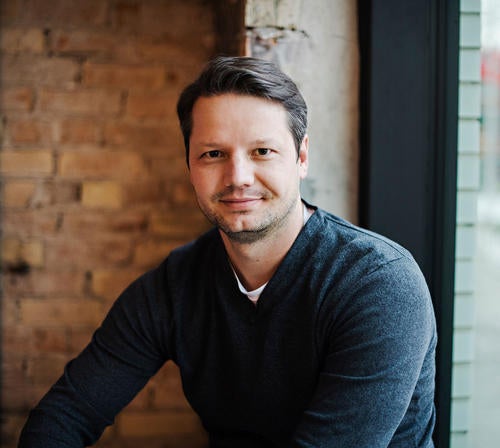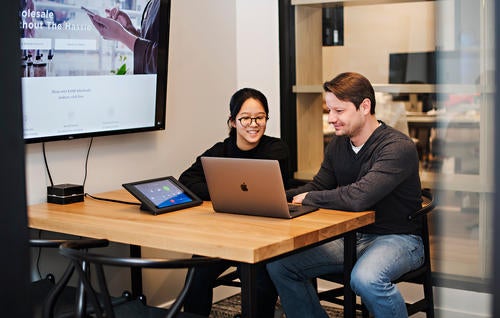
Bringing a unicorn to life
Faire taps into local talent to build region’s latest billion-dollar business

Faire taps into local talent to build region’s latest billion-dollar business
By Natalie Quinlan University Relations
Marcelo Cortes
Faculty of Mathematics
> CTO and Co-founder, Faire
Since the age of 11, Marcelo Cortes has been passionate about computers and coding. By 13, he was considered the “resident computer expert” after his parents bought a system for their family-owned store in Brazil.
Throughout the next decade, Cortes fueled his fascination, studying the new field of Information Technology in high school and college (at the discouragement of his parents), and committing to classes that would formally train him in programming.
By 18, Cortes had secured a well-paying job at a big-city consulting firm. He experienced the intricacies of business and imagined himself in his boss’ shoes, but he wasn’t convinced he was ready for the stresses that came with it.
Fast-forward two decades later, with a move to Canada, enrolment at the University of Waterloo and prominent roles with Google and Square under his belt, Cortes is now co-founder and chief technology officer (CTO) at Faire, an online wholesale marketplace for emerging brands and boutique retailers.
In just under three years, his company has reached “unicorn” status — an expression that reflects the rarity of startups reaching billion-dollar valuations. With offices in Kitchener, San Francisco and Salt Lake City, Faire employs more than 200 people, many with University of Waterloo connections.
His impact on the world of business doesn’t stop here. Earlier this year, when COVID-19 was declared a pandemic, Marcelo Cortes was quick to realize the devastating impact it could have on small, local businesses. Cortes and his team responded quickly with an online calculator designed to help these businesses find inefficiencies and better prepare for the future.
So how did this once small startup amass to a behemoth business in such a short time? For Cortes, it’s his team.
“The people, for sure, are a big part of the equation,” Cortes says. “We put a lot of effort into the team we bring in.”
Cortes understands the importance of what he calls, “experienced DNA from all over the world.” With the University of Waterloo down the road, Faire’s Kitchener-based office is just minutes away from local and international talent. In fact, Cortes estimates that around 80 per cent of Faire’s regional employees are Waterloo alumni or co-op students.
“A big part of remaining in the Waterloo region is because there’s talent here, talent that’s comparable to what you could find in Silicon Valley,” Cortes says. “And if we find talent elsewhere in the world, we can also bring them here.”
It’s taken a combination of talented minds and progressive business leaders to propel Faire from a startup to unicorn — and not every step has been easy either.
Two years after arriving in Canada, Cortes was ready to make Canada his home. He furthered his studies in computer science by enrolling at the University of Waterloo, home to one of the largest mathematics and computing centres in the world.
“It was very hard to get in. Waterloo looked at my marks and they weren’t great, so it didn’t make sense for the University [to accept me],” Cortes says.
But in familiar determination, Cortes pushed forward, reaching out to friends who had attended the University and vouched for his application through letters. The University took note, allowing him a shot at completing entrance exams in math and physics. Cortes aced both and was accepted.
Being so close to local talent landed Cortes in the sights of Google, getting hired as a senior engineer at just 28-years-old. “The first week that I started working there, I called my wife and told her this is like Disneyland for software engineers,” Cortes says. “Anything you could imagine was available to you. But after working there for a while you start to see no company is perfect.”
So, Cortes got to work.
By hiring several co-ops each term, Faire’s local presence has provided Waterloo students with ample job opportunities, leveraging talent like fourth-year Computer Science student Bella Lu. Lu worked on improving Faire’s website and enhancing the user experience.
“This has been the best co-op term I’ve had,” Lu says, a Waterloo international student from China. “Faire gives us work that is going to impact the user, so it feels good to show people the website and say that this feature was made by me.”

Computer Science student Bella Lu and Marcelo Cortes at Faire's office
It’s a role Lu says she’s proud of and will be returning to as an employee upon graduation. That’s right — Lu has already received a full-time job offer at Faire and so have the other four co-op students on her team.
The gains aren’t only good for the students. A recent study by Deloitte showed that for every $1 a business invests in a co-op student, they see a $2 economic gain.
“I feel very proud when I talk to my friends and family who are now asking for job referrals,” Lu says through a smile. “It feels good to be contributing to a big company."
For Cortes, the feeling is mutual.
“The beauty of the co-op program is that you get people who are motivated, they’re super smart and they already have experience — they add value,” Cortes says. “And when they graduate, we want to keep them here. So, that’s why we’ve stayed here.”

Read more
After early success with pro sports teams in the U.S., Penta Medical’s CEO returns to Canada to grow her HealthTech company

Read more
Waterloo founder built one of Canada’s fastest-growing tech companies by solving a problem for international students like him

Read more
Microsoft exec shares why co-op is a “win-win” for both students and employers
The University of Waterloo acknowledges that much of our work takes place on the traditional territory of the Neutral, Anishinaabeg, and Haudenosaunee peoples. Our main campus is situated on the Haldimand Tract, the land granted to the Six Nations that includes six miles on each side of the Grand River. Our active work toward reconciliation takes place across our campuses through research, learning, teaching, and community building, and is co-ordinated within the Office of Indigenous Relations.